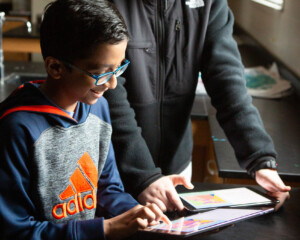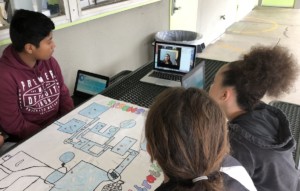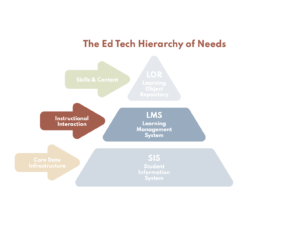Pittsburgh: University Inspired EdTech

“Pittsburgh is special place for startups,” according to Jason Lange of Bloomboard. Lange’s Silicon Valley teacher development system opened an office in Pittsburgh this year because of “an incredibly impressive talent base that has already demonstrated historical success in education, gaming and human-computer interaction.” Combine the talent base with a relatively affordable cost of living and an open community and political environment looking to embrace startups and innovative technology companies, and you’ve got an environment conducive to innovation.
A collaborative of educators, researchers, designers, and community leaders, and more are remaking learning every day by connecting students with hands-on learning experiences to develop relevant skills that the new economy rewards. The Pittsburgh Kids+Creativity Network helps children and youth develop their own interests, to work collaboratively to find creative solutions to problems, and to experiment, fail, and start over with new ideas. Helmed by non-profit organization, The Sprout Fund, the network supports collaboration between educators and innovators.
Utech. Pittsburgh Today ran a six part series a couple of years ago suggesting that “Pittsburgh is on the verge of reaching a critical mass in terms of the number of successful start-up companies, entrepreneurs, availability of local early stage capital and ability to push and pull university technologies to market.” Pittsburg universities played a pivotal role in the development of a new economy based on technology, finance, and health–particularly Carnegie Mellon University.
CMU has been an edtech hotbed for more than two decades. Characteristic of the city as a whole, CMU serves host to the type of coordinated talent you cannot get access to in many other places. CMU students are involved with prototyping applications for Bloomboard and other key student-led projects. The Human Computer Interface Institute (HCII) has a handful of interesting learning research projects underway. CMU is home to the Eberly Center for Teaching Excellence, Language Technologies Institute, and the OLI (Open Learning Initiative). Acrobatiq, an OLI spinout, focuses on evidence-based course design that measurably improves learning outcomes. With the goal of designing the future of edtech, CMU recently launched a Masters in Learning Science and Engineering.
The recently launched CMU Integrated Innovation Institute is an initiative to cross-train students in engineering, design and business with the goal of producing masters’ graduates with the skills and know-how to accelerate new product and service creation.
Founded by CMU cognitive and computer scientists, Carnegie Learning is a leader in secondary math software. The Apollo Group acquired Carnegie Learning for $75 million in 2011.
Elijah Mayfield developed the LightSIDE writing scoring engine as a grad student at CMU. His open engine scored high in the Automated Student Assessment Prize (see ASAP case study). LightSide Labs now builds automated writing support tools, including intelligent tutoring for middle and high school student essay writing. They’ve received support from the Bill & Melinda Gates Foundation and are piloting in nearby schools, including Upper St. Clair and Chartiers Valley.
Pitt’sLearning Research & Development Center was the source of the IP for SWoRD, a peer review writing assessment system that removes bias and is marketed by Panther Learning. Pitt is also home to Lauren Resnick’s Institute for Learning.
More EdTech. OnHand Schools, which manages large sets of student data, letting teachers drill down to the student level to cater to individual learning needs. Recently, Panther Learning and OnHand teamed up to offer curriculum and assessment solutions to more than 100 school districts, with a focus on improving how secondary schools will meet the Common Core writing assessment.
Think Through Math, formerly Apangea Learning, provides one-on-one math tutoring with live, online, certified teachers.
Duolingo is a language learning site that uses gamification and crowdsourcing to translate the web.
Saxifrage School is an alternative to colleges for vocational careers which has gotten some traction.
Digital Dream Labs is a new company in Pittsburgh doing impressive work on tactile programming games for early childhood computer science education.
Fitwits is “an obesity prevention and health literacy research project that uses games and character-driven narratives to transform unhealthy lifestyles into healthy ones.”
Consulting giant Accenture acquired Pittsburgh-based training and development shop Maynard in 2007 and created Accenture Academy, a blended learning solution serving over 100 clients in 140 countries.
In April 2013 Startup Weekend Pittsburgh saw more than 100 people participating in the third signature startup event. Winners from the last few Pittsburgh startups have formed companies, hired staff and even gone through accelerator programs.
Maker Hive. The MacArthur Foundation selected Pittsburgh as the third city to host a Hive Learning Network (along with NYC and Chicago). Hive Pittsburgh launched in the Spring of 2013 with a three month summer learning initiative. Hive Days of Summer activities have turned city sites into “maker” camps for teens.
Hive Pittsburgh is just one of many innovative learning initiatives happening in Pittsburgh. Tweens and teens have access to maker learning in MakeShop, STEAM learning atAssemble, on-line literacygames at community libraries, multimedia training at theLABS at the Carnegie Libraries, aRobotics Academy at Carnegie Mellon University, and even music remixing atHip Hop on LOCK.
To help spread maker and digital learning practices into more communities throughout the city, the Remake Learning Digital Corps recruits and trains mentors in digital and maker learning practices and matches them with community centers, after school programs, neighborhood libraries, and other informal learning spaces. Digital Corps mentors work with youth to help them develop digital literacy skills while making competencies through projects that bridge computer programming, crafting, and robotics.
TechShop, a big maker success from Menlo Park (featured on Bloomberg), opened a new location in Pittsburgh’s Bakery Square last year.
There’s also been a recent building boom of digital and maker learning spaces in public schools across the region:
- Shaler School District: Dream Flight Simulator;
- Elizabeth Forward School District: Entertainment Technology Academy, SMALLab, and “YouMedia” library; and
- Carlyton School District: theSTEAM Studio at Crafton Elementary School.
And it doesn’t just end with students. The Allegheny Intermediate Unit is transforming professional development withTransformeED – a digital playground for teachers to provide inspiration of how they can bring technology and maker practices into the classroom. And parents can get support through organizations ranging from theFred Rogers Center toWQED Multimedia.
Pittsburgh educators, innovators and organizations have come together to form the Kids+Creativity Network – more than 100 organizations, including public school districts, non-profit groups, libraries, museums, after school programs, and neighborhood community centers – which is committed to “remaking learning” in the greater Pittsburgh area. According to Gregg Behr of The Grable Foundation, through this network, “New pioneers—gamers, roboticists, technologists, and designers—are working alongside educators in and out of schools to inspire and provoke creativity and curiosity among children and youth in the Pittsburgh region.”
Students are also making policy. On Wednesday, The board of Pittsburgh Public Schools agreed to use a student bill of rights proposed by teens as a guide for revisions of the district Code of Student Conduct.
Pittsburgh has become a second tier EdTech hive even though the state of Pennsylvania gets a failing grade on the most recent Digital Learning Now Report Card. And, while there appears to be little evidence in Pittsburgh K-12 schools, the city is a pretty good example of university inspired innovation.
Thanks to Jason Lange,Elijah Mayfield, Gary Gardiner, Mark Limbach, Ryan Coon, Dave Guymon and Mary Ryerse for their help on this post. Tom is a Bloomboard director.








0 Comments
Leave a Comment
Your email address will not be published. All fields are required.